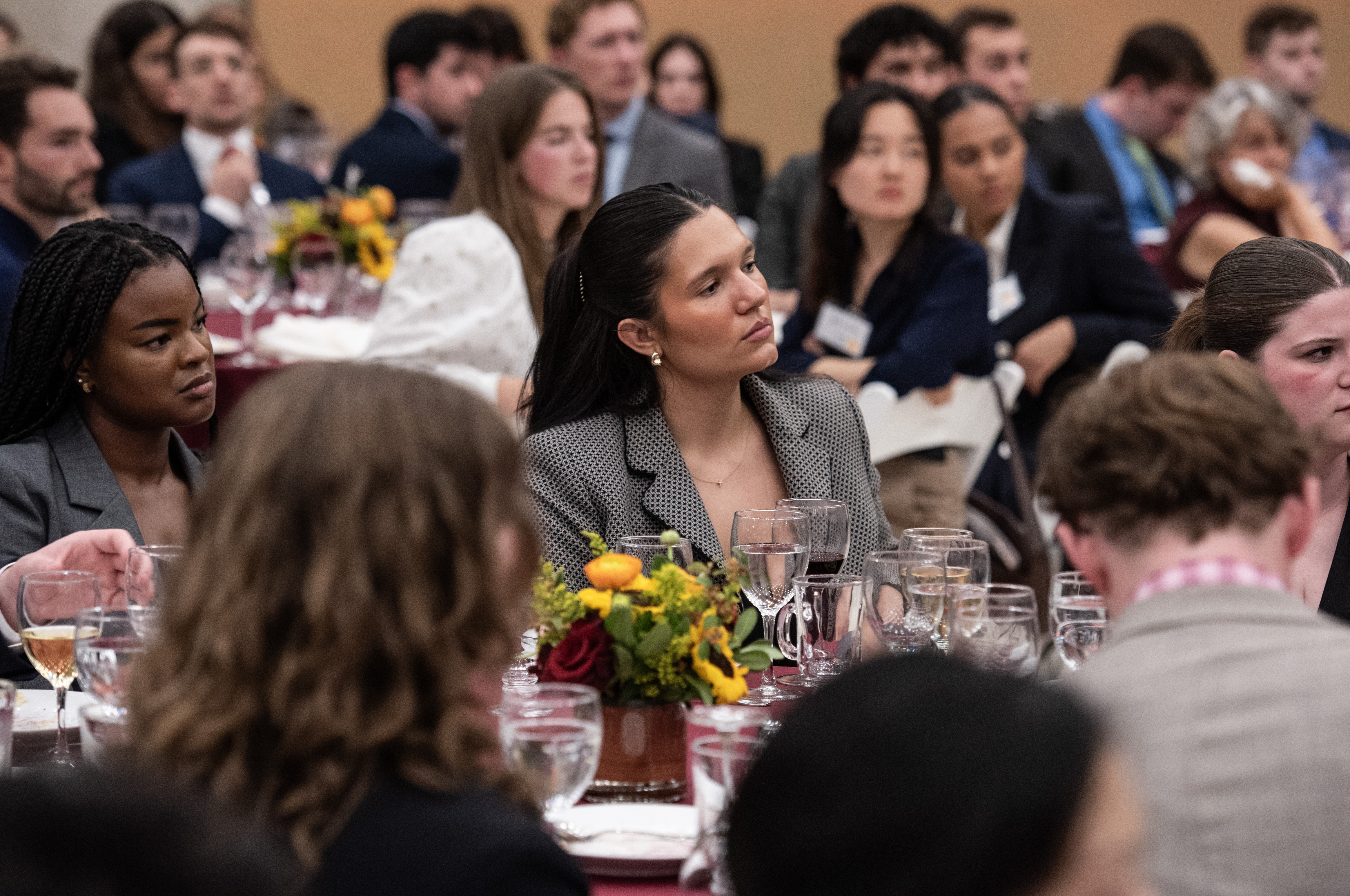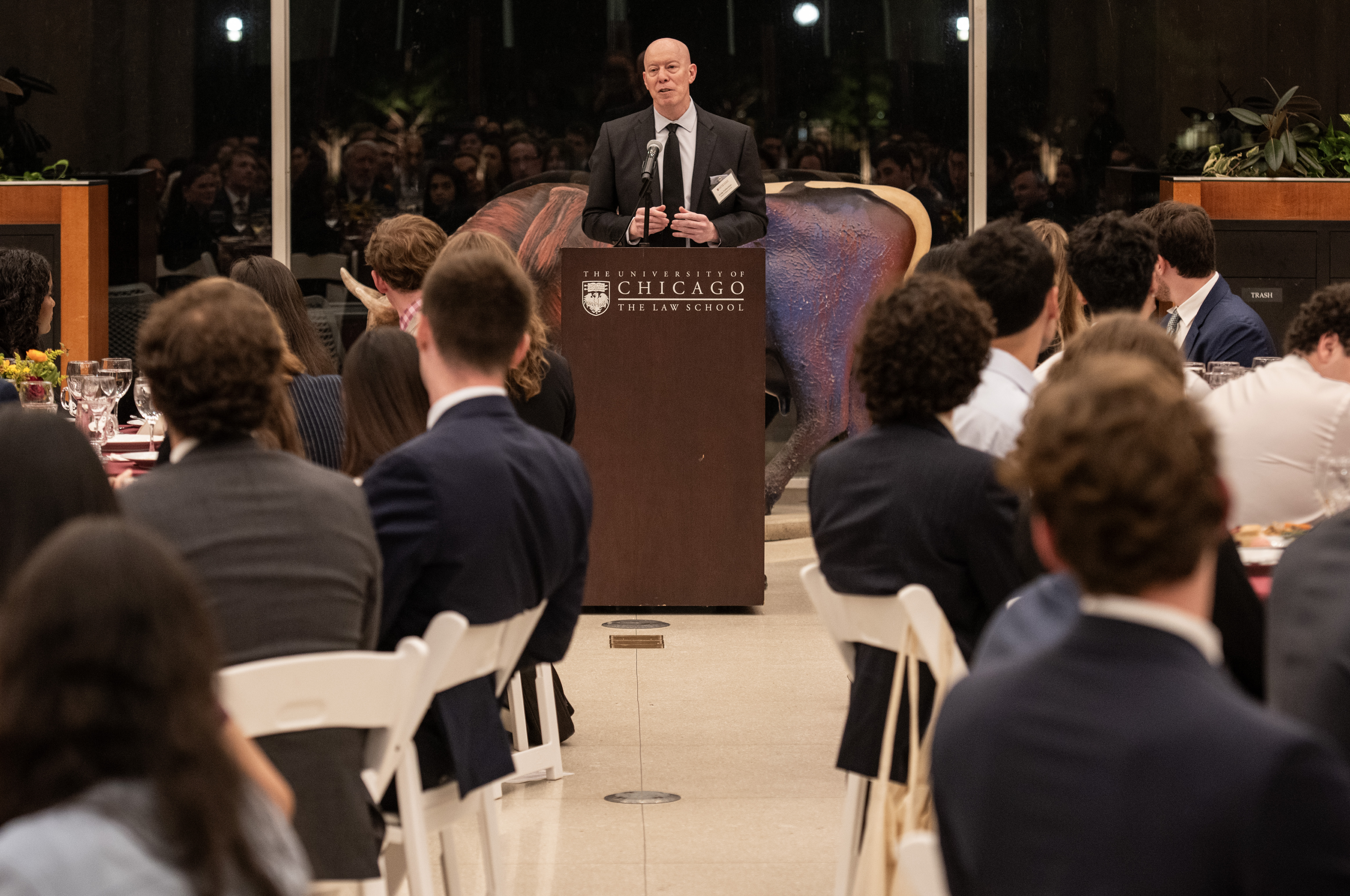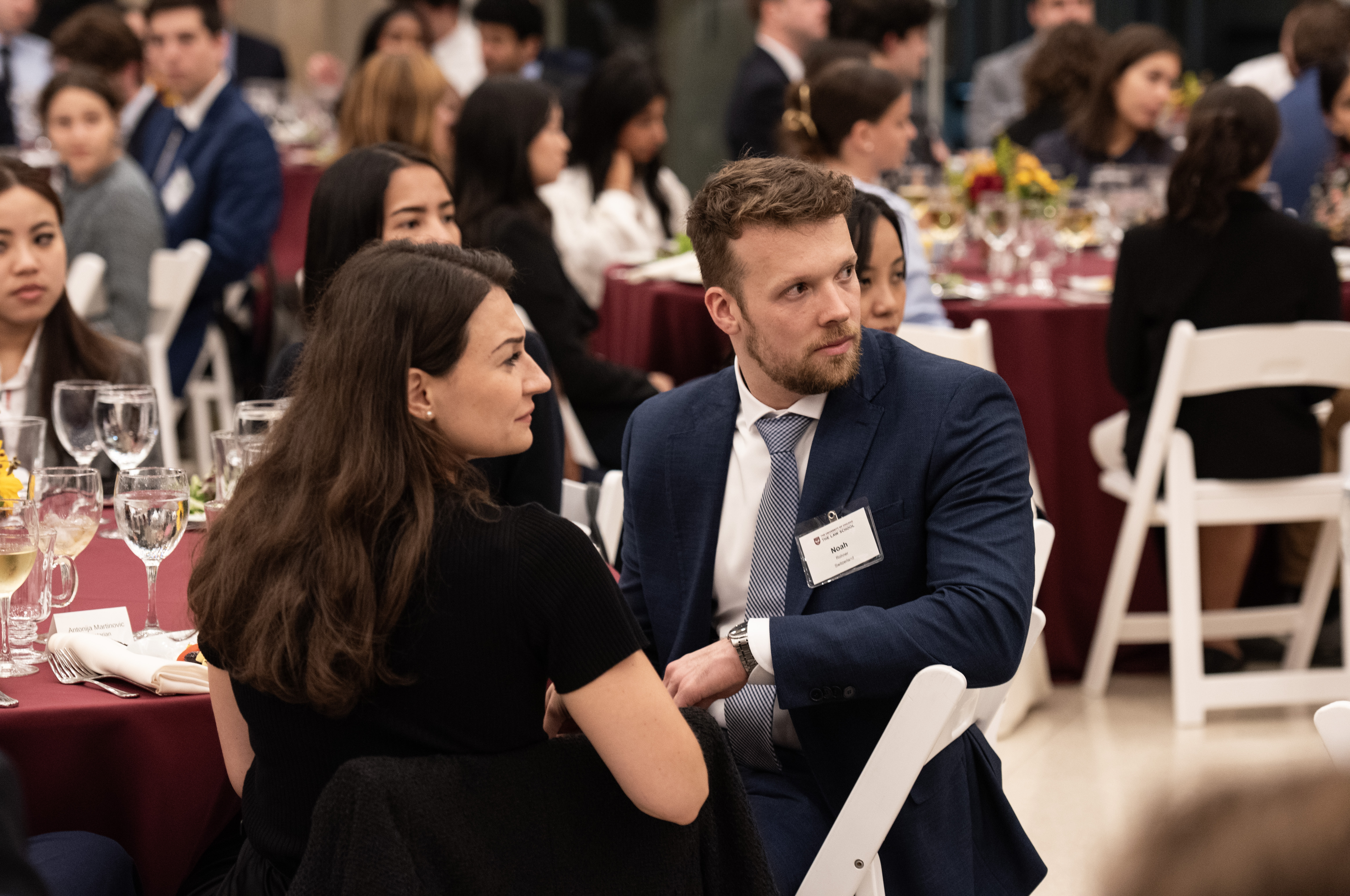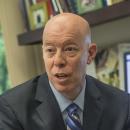“There Has Never Been a More Important Time to Go to Law School.”
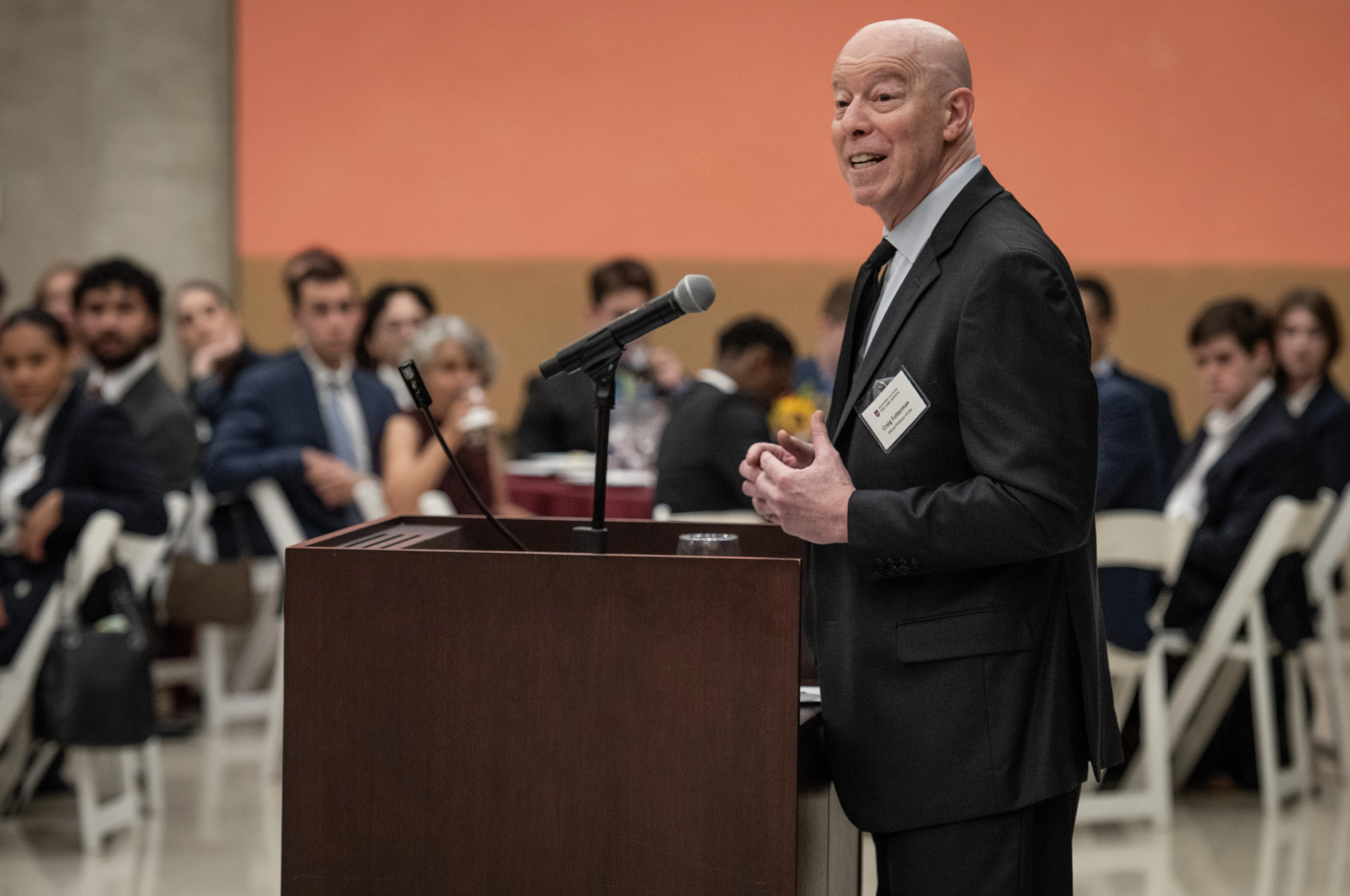
Shortly after I began teaching at the Law School, I got to know a young man who sold incense and oils outside the Reynolds Club, our student union here. His name was Corethian Bell, a 24-year-old homeless man living with mental illness. Someone who is fundamentally gentle and kind to his core.
One night, Corethian returns to his mom’s apartment. He’s worried about her because she hasn’t answered her door in three days. When he pushes the door open, he finds his mom’s body, dead, covered in blood.
Corethian calls the police for help. They take him to Area 2, a police station that had become infamous for the torture of Black men. He spends the next 50 hours locked incommunicado inside a tiny, windowless interrogation room. Chicago police detectives make him believe that he would die in that room.
They beat him. They prey on his vulnerabilities and force him to give a false confession on video to the murder of his own mother.
As Corethian sat frightened in a Cook County Jail cell, his mother’s real killer went on to assault at least four other women in his mom’s neighborhood.
Imagine if Corethian had access to a lawyer when the detectives first took him to that infamous police station, before those 50 hours of interrogation.
***
There has never been a more important time to go to law school.
There has never been a more important time to go to this Law School.
Everything we thought that we knew about the law is being challenged. (Some think for the better; others not so much.) The role of courts and our legal institutions, the meaning of our Constitution, access to legal services for people in need.
This time of change is also a time of historic opportunity. You will determine what the law will be. What the future will hold. What it means to uphold the rule of law.
“The first thing we do. Let’s kill all the lawyers.”
This isn’t just a joke about how annoying lawyers can be. It represents Shakespeare’s thoughts about how we create the conditions for tyranny. First you kill all the lawyers. The first and necessary step toward totalitarianism is to destroy the rule of law.
No law school has protected the rule of law more than Chicago. The rigorous training we give to our future lawyers, judges, policymakers, business leaders, and academics. You won’t just be prepared. You will be “Chicago-prepared.”
I know. That’s some heavy stuff. And law school can be a scary place. Shoot. This Law School can be a scary place. A demanding place. A place where people work hard. Really hard. Cold Calls. Constant questioning. A place where we interrogate everything. You will be challenged. Your ideas. Everything you think you know.
After Dean Chilton kindly asked me to give this talk, I began to ruminate: What can I say that would be helpful to you? I talked with other faculty, current and former students, my daughters, my wife!
Professor Masur told me that I should try to be funny. But I’ve gotten enough eye rolls from my daughters about Dad’s bad jokes to know when to stay in my lane. Professor Nou advised that I should think back to the time that I was that new, to use her words, “eager beaver,” law student.
The truth is that I wasn’t such an eager beaver. The feelings flooded back—the butterflies, fears, imposter syndrome—did they make some kind of mistake letting me in? What am I doing here?
What words may have been helpful to students like me?
Believe it or not, I really loved law school. I know that’s countercultural to admit. We’re supposed to complain about how hard it was, how tough we had it. But I had a great time. I truly loved trying and learning about things that I didn’t even know I was interested in. And doing things—applying what I was learning in law school clinics and the community to be of service to people in the real world. Finding my community, in and outside of school, where I could be my full self and be affirmed and supported, no matter how crazy I was sometimes was made to feel.
That I wasn’t alone. I wasn’t the only person feeling this way.
Let me start with some advice that I regularly give students—stuff that folks tell me has been helpful to them: Don’t forget why you came to Law School.
What brought you here? What brought you to the University of Chicago Law School, or as you’ll soon refer to it, simply as the Law School? You’re each here for different reasons.
However, as you navigate this place, you’ll see many of your peers follow a common path, and you may begin to believe that we’re all supposed to follow this magical road to success. There can be a bit of a herd mentality in law school. At designated times, we see fellow students begin preparing for their Big Law interviews, applying for prestigious journals, chasing prized clerkships, and we think, isn’t this what we’re supposed to be doing? It can feel terrifying not to follow this tried-and-true path when everyone else seems to be doing it, when it’s all laid out neatly in front of you, especially when venturing off the beaten path breeds uncertainty. (Only the yellow brick road leads to the Wizard’s House, right?) It’s hard not to get caught up in that.
When you experience that pressure (and you will), don’t forget why you’re here. Remember the why. Ask whether and how the things that many of your peers are doing will advance your goals. Don’t get me wrong. They may be exactly what you should be doing to get where you want to go. But they may not.
No matter what you do, it should be an active decision. Your choices should be just those—exercises of your own agency. Remember there is no single right path other than your own.
At the same time, try new things. This is the time to experiment. Remembering why you came here doesn’t mean that you should close yourself off to new experiences or that your goals can’t change. Law school offers a wealth of opportunities. You’re attending school in a world class city with so much to offer. There is plenty of space for each of you to find your space and discover space you may not have known would be there for you. You’ve got to be open to trying and learning new things. Choose something you wouldn’t ordinarily do and explore it with an open mind.
One of the cool things that Law School can do is to help you to know yourself better. Your strengths and weaknesses. What you most enjoy. What you don’t like. Where is your place in all this? You won’t know if you don’t try.
Enroll in a clinic while you are here! (Forget about what I just said that you shouldn’t all follow the same path.) Everyone, I mean everyone, no matter what you plan to do after law school, should take a clinic. Clinics are the space in the Law School where theory and practice come together. The place where you learn all that it really means to be a lawyer. To see all you can do with your degree. And to help somebody while you’re here. I can’t tell you how many former students who thought they knew what they wanted to do and then enrolled in a clinic and found a new calling that they had never imagined.
***
Did I mention that this is a place where we interrogate everything? A place where we ask difficult questions. Where everything is subject to debate. That’s our normal.
Embrace that.
This is what makes us great (our special sauce). And I’m not going to lie; it can also be a challenge. This is an intense place. Standing up before your teachers and peers, putting yourself out there, making yourself vulnerable, exposing yourself to criticism… As difficult as that is, as terrifying as that is, as uncomfortable as that is, embrace it. Learn to live with that discomfort. And it will get better. I promise.
We will disagree, sometimes vehemently, including about things that are fundamental to who we each are and the way we see the world. And that’s a good thing. As you begin your journey today at the Law School, I ask that we each commit to treating one another with respect. Nobody gets put down for trying. We don’t disparage or make fun of anyone when something doesn’t go as planned.
At the same time, we can all benefit from critique. When we open our ideas and our work to critical feedback, and when we give one another that feedback, we don’t hold back. We do it to make one another better. Better lawyers. Better teachers. Better advocates. And ultimately (I hope), better people.
***
When I was growing up, I was obsessed with fairness. I was that annoying “that’s not fair” kid. Truth be told, I still am. In my view, it’s critical that we call out laws and court decisions that offend our sense of justice. (You see why I became a law professor!)
But at Chicago, our conversations don’t end just by saying, “That’s not fair.” That’s just the beginning. Justice means different things to different people. If we believe that the law can and should be about fairness, that the arc of the moral universe bends toward justice, we need to show and prove it. Why isn’t it fair? Debate it. Defend it. And do something about it.
The law is not static. It’s a living thing in a constant state of change. A little more than 10 years before I was born, the law forbade my family members from riding in the front of the bus, going to certain schools, marrying certain people, even drinking from certain water fountains. It would have been illegal for my wife and I to have gotten married.
You will determine where the law goes from here. You will determine whether it will bend toward justice.
***
Alright! I’m going to let you in on a little secret. Want to know the most underappreciated quality that is essential to succeeding as a law student?
Listening.
My people—y’all love to argue with each other. There are lots of “type-A” personalities in the house. And I love y’all.
In most law schools, we’re not taught to really listen to one another. To be open-minded. Open to persuasion. Open to changing our views. Open to learning. Active listening is a skill. There’s nothing passive about it. We are so obsessed with talking—making our arguments the best they can be—that we’re often not listening.
We learn best when we’re in conversation with other people. Not talking or arguing to other people. And not just from conversations within our own community, with people who agree with us. But in conversations with people outside our community. Be open to learning from people who are not like you.
The same thing goes for the courtroom. If we are consumed only with the next thing that we’re going to say, we are missing critical opportunities to learn and to persuade. A couple of weeks ago, I was arguing a “big” case in court. I spent hours and hours preparing with others, brainstorming about questions that may be asked, mooting counterarguments. I was “Chicago prepared.”
And being Chicago-prepared enabled me to be fully present in the moment—to listen—not just to the words of opposing counsel and the judge, but to their body language—to how they were feeling. As a result, when I spoke, I had a far greater understanding of what I needed to convey to move the Court to see things our way. I couldn’t have done this if I were focused only on my next words.
Being a good listener is closely related to being humble. Acknowledging that we don’t know everything. That we can learn from each other.
How many of you know the Parable of the Blind Men and the Elephant?
In short, a group of blind men come across an elephant. They had never encountered one before and wanted to understand what an elephant is. Each person touches a different part of the elephant: one touches the tusk and concludes that elephants are like spears-like weapons that cut things; another touches the tail and announces elephants are like ropes; another feels the elephant’s leg and insists that elephants are like tree trunks. nd so on. Each individual gives a vastly different description, believing what they’ve experienced to be the absolute truth.
One of the most important things in law school is knowing when you’re blind, knowing when you’re not seeing the whole picture and having the humility to listen and learn from different perspectives.
As Professor Nou reminded us, you come here as a full human being. Leave here as one. Law is a human profession. What you do affects real people. Being a lawyer, being a law student, is just part of your identity. As much as we boast about training you to think like a lawyer, it begins with thinking of people first. Thinking like a human being.
And part of retaining who you are, your whole self, is emotion. Don’t let anyone tell you that emotion has no place in the law or at this Law School.
To be a successful lawyer, you need to do more than learn to think like a lawyer. You need to tend to your whole self.
For my final piece of advice tonight, I went to one of the best experts: my daughter Alijah who just graduated from law school last year. She was very negative about law school. (That’s because she didn’t go to the University of Chicago Law School!)
She told me, “Law is fake,” meaning that the law is all political. It doesn’t mean anything. It means what people in power want it to mean.
While it’s difficult to deny the extent to which politics shape the law, including cases before the Supreme Court, I said, “Come on, girl. Help an old man out…”
She thought about it, and she called me the next day. She said, “Dad—I really appreciated your advice to remember why I came to law school. It helped me as I found my path. But I think you gotta go farther than that.”
“It’s also about your red lines,” she explained. “Your ethical and moral boundaries when you begin law school.”
She advised, “Students really need to write those down before they begin law school. The law and legal institutions are powerful. Remember what you believe is right.”
The ethical and moral components of who we are. What do I think is right? Where are my boundaries? What are my ethical and moral lines? What are my non-negotiables?
Like Alijah said, write them down! Whatever your lines may be.
Law school and legal institutions will challenge those lines. It’s easier than you think to let go of what you think is right. Lines will blur. Resist the urge to mimic unethical behavior, confusing bullying with strength. When you feel yourself twitching and fidgeting, know that there’s a reason. Trust yourself.
Kathleen Rubenstein is one of my former students who I consider to be a hero. She came to the Law School to do public interest work, to advance our civil rights, to serve others. She was a supremely ethical person who had clear lines about what she believed was wrong and right. When she was sitting where you sit today, she was full of hope, ideals, and dreams.
A few years after she graduated, she landed her dream job as the director of public interest fellowships at a large firm. She controlled millions of dollars of resources to fund graduating law students to pursue the public interest work of their dreams. This fellowship has provided critical legal services to thousands of people in need. It has launched public interest legal careers of countless new lawyers. It has produced so much good in the world. Kathleen is in charge of all of that.
Like many other firms, her firm made a deal with the Trump Administration, where it would provide $100 million dollars in free legal services to causes of the President’s liking. Public interest work disfavored by the Administration would go unfunded. Lots of law firms and universities have made similar deals.
We all have different lines. This crossed Kathleen’s lines. She long believed that the government should not control whether lawyers are permitted to represent certain clients, take on certain cases, or decide what should count as acceptable public interest work. That lawyers should be free to take on the cases and clients of their choosing. The question she had was: Should she reexamine her lines?
Her decision was anything but easy or clear. If she stayed, she could continue to do so much good. Think of all the ordinary people and new lawyers she could support, notwithstanding the restrictions. On the other hand, she and her firm wouldn’t have the freedom to provide counsel to lots of people in need, including types of work that were most important to Kathleen. She anguished over the decision.
She calls me, hurt and uncertain, and tells me about the red lines that she drew when she was sitting where you are in the Law School. The deal that her firm felt compelled to make—restrictions on lawyers’ freedom to represent clients and fund pro bono work of their choosing crossed her moral lines and core beliefs about the meaning of the rule of law. I listen as she reflects on everything. She tells me that she knows what she must do.
Two days later, Kathleen resigned from her dream job.
Many of us may have made a different decision if we were in her shoes. It’s an intensely personal decision based on our own personal moral lines. Our own red lines may be very different from hers. But this, I know. It took unspeakable courage for Kathleen to give up all that power, money, and prestige to stay true to what she believed was right.
***
This is not only the most important time to go to law school. It is also a uniquely challenging and polarizing time. You may feel isolated, powerless, and alone. You may feel like I did—like you’re an imposter—like you don’t belong.
No matter how you feel, please know that you are not alone. You belong here. You are here for a reason. I’m not going to pretend that it’s easy or that it can’t be disheartening. That’s why you are here at this law school. That’s why we challenge each other. Because it is hard. Because what you do matters. Because you can make a difference. Because you will make a difference.
Remember Corethian Bell. Our students’ work with Corethian opened people’s eyes across the nation to the reality of false confessions; it generated research and knowledge that guide us today; it led to new laws that bent the arc of the moral universe closer to justice; it laid the foundation for a consent decree won by my clinic students to address a decades-long practice of incommunicado detention in Chicago—to make real people’s right to prompt access to counsel and a phone when taken into custody.
If there is one thing that I’ve learned in my 25 years at the Law School, it’s that things don’t change by themselves. They change only when we make them change.
Welcome to the University of Chicago Law School.
You are now our guardians of the Rule of Law.
